- Home
- Robert Goddard
Into the Blue Page 2
Into the Blue Read online
Page 2
With every yard that the car carried Harry away from Profitis Ilias, the influence that it had exerted on his mind faded. Soon it became easy to reason away what had happened. His brain, deprived of its normal stimuli, had begun to play tricks on him: that was all. Heather had lost her way and faced the dismal prospect of a night in the open. With help from Salakos, however, he might be able to spare her that. Even if the worst did come to the worst, she should be able to shelter till morning. Twelve uncomfortable hours lay ahead of her, twelve anxious ones ahead of Harry. Then normality would resume.
* * *
Not until the very last moment did Harry see the goat standing directly in his path. It had wandered into the middle of the road just beyond a hairpin bend and almost seemed to be lying in wait for him, so difficult was it to make out in the deep shadow of the overhanging trees. With his foot hard down on the accelerator as he emerged from the bend, Harry wrenched instinctively at the wheel as soon as he saw the creature and succeeded in narrowly avoiding it. But his relief lasted no more than a second. As the car skidded across the road, he realized he was heading straight for a sheer drop on the other side. It was too late to brake and the roadside fence looked too frail to hold him back. All he could do was aim for one of the stout concrete fence-posts and hope for the best. An instant later, there was a great, jolting thump, an explosion of steam from the bonnet and a blare of the horn as Harry hit the steering wheel.
For a minute or so, he was too dazed to move. Then he pushed the door open and stumbled out. The goat had fled – he could hear its bell clanking away frantically into the forest – but it was obvious that the car was going nowhere. The front was staved in and the offside wheel was twisted round at an angle. Harry leaned against the roof, swearing under his breath. His head hurt and his ribs ached. He felt in need of a stiff drink, but he was a long way from getting one. This latest misjudgement had only worsened his plight – and Heather’s as well.
Weary and self-pitying though he felt, Harry knew he could not afford to indulge the mood. With a last reproachful kick at the distorted wheel of the car, he turned and began to trudge down the road.
2
INSPECTOR MILTIADES STARED at Harry for some time from the doorway. Then he walked slowly across to the table and sat down opposite him. Harry had waited six hours for him to return, six hours that had seemed like as many days, yet he felt reluctant to ask what the Inspector had found, deterred by the slowly stirring conviction that the truth was bound to be worse than the worst he had imagined.
All day he had been kept in this bare and sparsely furnished room at Rhodes Police Headquarters, with only the clock on the wall, the blank face of the constable guarding the door and his own limitless thoughts to scan for clues as to what Profitis llias might have yielded to its searchers. More than twenty-four hours had passed since his last sight of Heather and now, as the failing light beyond the half-shuttered window signalled, night was once more about to draw its veil across her whereabouts. Unless, of course, Miltiades already knew them.
But Miltiades’ expression communicated nothing. A thin, ascetic-looking man with his well-pressed uniform and sleek black hair, he carefully removed his spectacles, massaged the sore patches on his nose, then replaced them, all the while keeping his solemn unblinking stare fixed on Harry.
Harry’s lips parted in readiness to speak, but an upward twitch of the other man’s eyebrows at once dissuaded him. Then, struggling to order his thoughts, he said: ‘What have you to tell me, Inspector?’
Miltiades did not reply. Instead, he drew a small tape recorder from the briefcase beside him, placed it on the table between them and switched it on.
‘I think I’ve a right to be told something.’
Miltiades leant forward onto his elbows. When he spoke, it was in Greek, and his remarks were addressed to the machine. ‘To Savato thotheka Noembriou chilia enniakasia ogthonta okto, exinta treis ores.’ Then he looked straight at Harry and said, ‘What would you expect to be told, Mr Barnett?’
‘Whether you’ve found Miss Mallender, of course. Whether she’s all right.’ Harry could hear the rising note of impatience in his voice, but could not suppress it. What business had the man prolonging his agony like this? ‘You’ve had all day to search Profitis Ilias. What have you found?’
‘We shall assume, for the purposes of this interview, that we have found nothing.’
‘What the hell does that mean?’
‘It means that you will answer my questions before I answer yours.’
So that was it. The suspicion that had been growing on him all day was finally confirmed: they did not believe him. That was why he had not been allowed to remain on the scene when the search began. And that was why Miltiades was telling him nothing: because he hoped protracted uncertainty would lead Harry to betray himself. What did they think? he wondered. That he had murdered Heather? That he had buried her up there on the mountain? Why should they think such a thing – unless they had found something to plant the idea in their mind? Her body, perhaps? Good God, it was too awful to contemplate.
‘You have lived on Rhodes since March 1979, Mr Barnett?’
‘What?’
‘You have lived here for nine years, I believe.’
Harry could not concentrate in the face of all he now envisaged. He could only appeal to Miltiades’ mercy. ‘For God’s sake, Inspector, just tell me: is she dead?’
Miltiades’ expression did not alter. ‘We shall assume, for the purposes of this interview, that we do do not know.’
‘You callous—’ Harry closed his eyes, willing himself to repel the vision that had just formed in his mind: Heather’s white, naked body supine on a mortuary slab … When he opened his eyes, Miltiades’ searching stare was still fixed upon him.
‘Endaksi. We will begin at the beginning. You have lived here since March 1979 as caretaker of a house in Lindos – the Villa ton Navarkhon – owned by a fellow-countryman of yours. Is that correct?’
The vision had gone. In its place was this blank, sterile room where his interrogation was about to commence. He thought of the psarotaverna where they had lunched, of how warm it had been at their table beneath the rubber tree, of how softly the shafts of sunlight had fallen upon her hair. He felt tears start in his eyes and, swallowing hard, he said: ‘That is correct.’
‘Your full name is Harold Mosley Barnett.’
‘Yes.’
‘Mosley is an unusual Christian name is it not?’
Was this what the fellow meant by beginning at the beginning? ’Oswald Mosley was a British politician of the inter-war years, Inspector. My father approved of his views.’
‘Which were?’
’He was a fascist. Enas fasistis.’
Miltiades nodded. ‘A pity for you.’
‘I don’t let it worry me.’ It was strange to be reminded of his father by, of all people, a Greek policeman. He had not thought of him in years, that blurred, remote figure from his past whom he knew only from photographs and his mother’s unsentimental memories. ‘How did—’
‘You were born on the twenty-second of May 1935.’
‘Yes. But—’
‘At Swindon in Wiltshire.’
‘How do you know all this?’
‘It is in your passport.’
‘My passport?’
‘I have it here.’
For a moment, Harry could not speak. They had been to Lindos and searched his belongings. And all the while he had sat here believing them to be combing Profitis Ilias inch by inch.
‘It was Miss Mallender’s passport that I was looking for,’ Miltiades continued. ‘Do you know where it is?’
‘In her handbag, I suppose. But you had no right—’
‘We telephoned the owner of the house, Mr Barnett. When we explained. the circumstances, he readily gave his consent.’
So. They had spoken to Dysart. And what had they told him? God alone knew. ‘Why are you so curious about Heather’s passport?’ For
the first time, Miltiades smiled. ‘Now it is “Heather”, not “Miss Mallender”. Did she object to you addressing her by her Christian name?’
‘Don’t be so bloody— Why should she?’
‘Because she was staying in Mr Dysart’s house as his guest – and you were there as his employee.’
‘I’m not his employee.’
‘Then what?’
What indeed? The difference was a fine one, as Harry would have to admit. ‘I look after the house for him in exchange for free accommodation.’
‘His tenant, then?’
‘In a sense.’
‘That sense is something I am curious about, Mr Barnett. You should have told us sooner what an eminent person Mr Dysart is. A Member of Parliament. A minister in the British government.’
‘A junior minister.’
‘How is it that such a person entrusts his holiday home on Rhodes to your care?’
‘Why shouldn’t he?’
For answer, Miltiades surveyed Harry with barely disguised contempt. ‘How did you first meet Mr Dysart?’
‘He worked for me once when he was a student. A long time ago. But what has this to do—’
‘With Miss Mallender? I hoped you would tell me, Mr Barnett. Her brother is flying here from England tonight. He and his parents were astonished to learn that you and Miss Mallender were … friends. I believe you worked for Miss Mallender’s father before you came to Rhodes.’
‘Yes. I did.’
‘And that you were dismissed as a result of a financial irregularity. ‘
‘An alleged financial irregularity.’
‘The point is, Mr Barnett, that you are not the companion Miss Mallender’s father would have chosen for his daughter. You might still bear him a grudge. You might want to hurt him – or somebody close to him.’
‘I don’t give a damn what …’ His voice trailed away into silence. This was indeed worse than he had imagined. All he wanted to know was whether they had found Heather. If they had, she must be dead, for she would never have permitted this nonsense to be perpetrated in her name. But if not …
‘You are fifty-three years old, Mr Barnett. Have you ever been married?’
‘No.’
‘Have you any children?’
‘No.’
‘A man alone in the world, then.’
‘You could say that.’
‘What do you do to satisfy your … sexual needs?’
Harry felt his jaw drop. Did their suspicions have to weevil their way back to this last and grubbiest of resorts? He had liked Heather. He had liked her very much. But, strangely, lust had never tainted that liking. Somewhere else, with somebody else, it could easily have done. But not with Heather. ‘I drink too much, Inspector. What do you do?’
‘I have read the statement you made in Salakos last night very carefully, Mr Barnett. You remember what you said?’
‘Of course.’
‘I will refresh your memory.’ He reached down to the briefcase and lifted out a sheaf of papers. ‘Your description of Miss Mallender: “Approximately five feet six inches tall. Twenty-seven years old. Shoulder-length flaxen hair.” Flaxen is an interesting word, Mr Barnett. I am a student of words. I pride myself on my knowledge of the language.’
‘Justifiably.’
‘But flaxen I did not know. It is a very particular word. It suggests that the person you were describing made a great impression on you.’
‘It’s just a colour.’
‘But the colour of what? The colour of desire, perhaps? You did not say whether Miss Mallender had a good figure.’
Harry felt the blood rush to his face. Say nothing, he told himself. Don’t let this man provoke you. He thinks he’s very clever. Prove he isn’t.
‘Is she fat? Is she thin?’
‘Neither.’
‘Perfectly proportioned, then. A veritable Aphrodite.’
‘Go to hell.’
Miltiades smiled. ‘Let me return to your statement. You described the clothes she was wearing. “A pink and white scarf.” Which you later found, of course. And later still lost. “Black corduroy jacket. Red sweater. Navy blue woolllen gloves. Pleated tartan skirt, knee-length. Black walking shoes. Black stockings.” That is what you said?’
‘Yes.’
‘Stockings, not tights.’
‘Yes. Stockings, not tights.’
‘How do you know?’
‘Know what?’
’Which she was wearing?’
‘I don’t.’
‘Then why specify stockings? Are you saying now that you cannot be sure?’
‘Of course I can’t. It was just a word.’
‘Another very particular word, Mr Barnett.’
‘Meaning what?’
‘Meaning that you may be in a position to know whether she was wearing stockings or tights.’
Rage was gnawing at Harry’s resolution. What had they found? Anything or nothing? Whichever it was, Miltiades was not about to tell him.
‘We found the car, at the point you described. In your statement, you said it was empty.’
A trap-door seemed to open beneath Harry’s feet. The car. Surely Miltiades did not mean … He had not checked the boot. He should have done, but he had not thought to. ‘Are you saying it wasn’t empty?’
‘Not quite. There was something in the glove compartment.’
The relief must have been visible on Harry’s face ‘What was it?’
‘Two unused postcards. I have them here.’ He laid one of them on the table. ‘Recognize it?’
It was a photograph of the Aphrodite of Rhodes, the famous statue of the goddess drying her hair in the sun after emerging from the sea. ‘Yes, Inspector, of course I recognize it. There must be hundreds of these postcards for sale on Rhodes, for Christ’s sake.’
‘You did not buy this card, though?’
‘No. Heather must have.’
‘And this?’ He placed the second card alongside the first. It was another photograph of a statue: the satyr-god Silenus, half-goat, half-man, flaunting, in this representation, a hugely erect phallus.’
Harry said nothing. There was nothing he could say. He had seen both these pictures before, of course, on postcard-racks the length and breadth of the island. And he could guess why Heather had bought them. The one as an object of beauty she would characteristically have admired. The other in preparation for a joke she had no doubt planned to play on him later. ‘Who’s Silenus?’ she had asked him, on discovering his association with the Taverna Silenou. ‘Better that you shouldn’t know,’ he had teasingly replied. But now the tease had rebounded on him.
He looked up and found Miltiades’ eyes ready to engage his own. There was no longer any doubt what the Inspector thought. A beautiful young woman carved in soft white marble; a debauched old man cast in harsh, green bronze: the parallels were too striking to resist.
‘Heather must have bought both of them,’ Harry said at last. ‘To send to friends in England, I suppose. I didn’t know they were there.’
Miltiades took a deep breath. ‘Would Miss Mallender have thought it amusing to send such a card as this’ – he pointed at the obscene depiction of Silenus – ‘to “friends in England”?’
Harry hesitated. How honest to be, or how dishonest, with this shrewd and patient man was a riddle beyond his solving. ‘No,’ he said, subsiding into honesty. ‘She wouldn’t have thought it amusing. She would have bought it for another reason.’
‘What reason?’
‘During the season, I wait at table and wash-up at a taverna in Lindos. The Taverna Silenou.’
Miltiades nodded. ‘I know, Mr Barnett. The proprietor is Konstantinos Dimitratos. We have spoken to him. He has been most … informative.’
‘You’ve spoken to Kostas?’
‘Certainly.’
‘Why? He hardly knows Heather.’
‘But he knows you, Mr Barnett. For the moment, that is more useful to me. What he told me was most v
aluable.’
‘What did he tell you?’ Harry knew Kostas would not deliberately have blackened his character, but the poor man’s instinctive respoase to uniformed authority could still have been damaging.
‘Many things. For example, I gather you had some difficulty with one of his customers last summer. A Danish girl … of about Miss Mallender’s age. Pretty, was she?’
Harry could almost hear Kostas blurting the story out. He would have said anything to appease Miltiades. For Harry, however, there was no hope of doing the same. ‘A misunderstanding, Inspector. That was all.’
‘Of course. Did she have flaxen hair?’
‘No. Nor was she “a veritable Aphrodite”.’
Miltiades gazed at him for some moments in silence. Then he said: ‘Had you ever met Miss Mallender prior to her arrival in Rhodes on the seventeenth of October?’
‘No. That is … I don’t think so.’ But he had met her before. The occasion recurred to his mind as he spoke. Two girls straight from school, still in their uniforms, climbing from their mother’s car on the forecourt of Mallender Marine, come to pay their father a visit. Their father. His boss. Grey weather. The season? That he could not recall. Perhaps autumn. Perhaps this very same, ever-darkening time of year. Portland Harbour a dull, flat, neutral backdrop. And two girls, one a little haughty, a little aware of herself, preparing for womanhood, whilst the other, with socks round her ankles and a gap-toothed grin, must surely have been … Heather, unawarely glimpsed by a bored, slightly hung-over, fourteen years or so younger Harold Mosley Barnett.
‘You don’t think so? So much uncertainty. It will not do, Mr Barnett. It really will not do.’
‘I may have met her, when she was a child. I did work for her father, after all.’
‘Of course. I must not forget that. But, when she came to Lindos, it was as a stranger to you?’

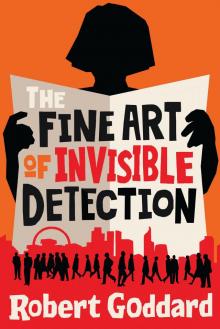 The Fine Art of Invisible Detection
The Fine Art of Invisible Detection One False Move
One False Move Panic Room
Panic Room Beyond Recall
Beyond Recall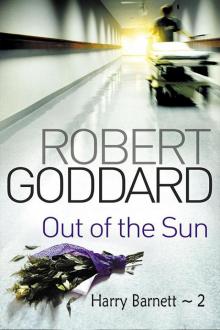 Out of the Sun
Out of the Sun In Pale Battalions - Retail
In Pale Battalions - Retail Painting The Darkness - Retail
Painting The Darkness - Retail The Corners of the Globe
The Corners of the Globe Name To a Face
Name To a Face Closed Circle
Closed Circle Caught In the Light
Caught In the Light Into the Blue
Into the Blue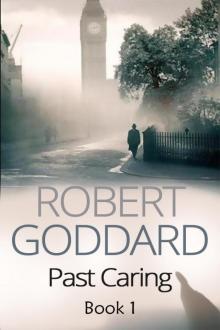 Past Caring - Retail
Past Caring - Retail Past Caring
Past Caring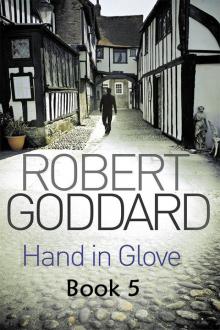 Hand In Glove - Retail
Hand In Glove - Retail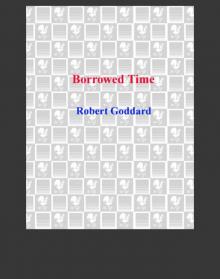 Borrowed Time
Borrowed Time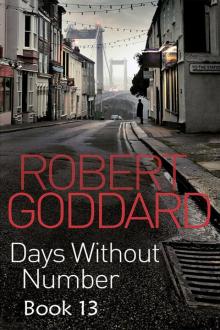 Days Without Number
Days Without Number James Maxted 03 The Ends of the Earth
James Maxted 03 The Ends of the Earth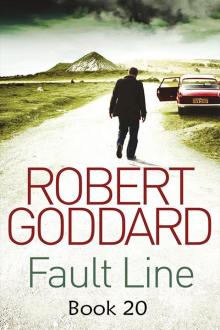 Fault Line - Retail
Fault Line - Retail Play to the End
Play to the End Sea Change
Sea Change Never Go Back
Never Go Back Take No Farewell - Retail
Take No Farewell - Retail Blood Count
Blood Count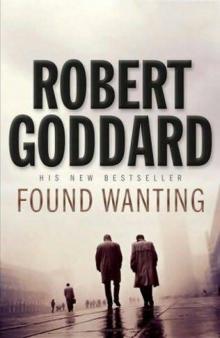 Found Wanting
Found Wanting Sight Unseen
Sight Unseen Hand in Glove
Hand in Glove The Ways of the World
The Ways of the World